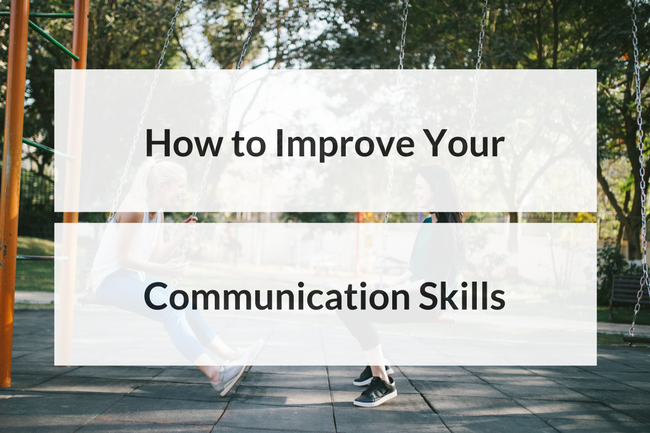The ability to communicate effectively is not a skill everyone has, yet it remains the most important life skill of all. Even if your talents are lacking in this area, it doesn’t mean you can’t develop better communication tactics with the right research, persistence and practice. You’re probably wondering how to improve your communication skills and why. With strong communication skills, you will gain a better understanding of not only yourself but also other people around you.
You’ll also become a better problem solver and learner and therefore grow your career. To connect with those around you and gain their trust and respect, you have to remember that communication is key. So how can you improve your communication skills?
There are three types of communication — interpersonal, verbal and non-verbal, like body language or tone of voice. Listening also plays a crucial part, so without it, you aren’t communicating as well as you may think. In fact, 45 percent of our time is spent listening.
Each of these types holds equal importance because the way in which your communication will determine the transfer of information from one place to another. It’s easy to miscommunicate, especially if you’re lacking in one or more of the above areas. If you have good interpersonal communication skills, you will do better in a group setting where you’re able to build rapport and relationships as well as provide feedback effectively. This set of skills will also help enhance your presentation, writing and personal skills.
To communicate is to have power, so check out the below five tips to find out how to improve your communication skills today.
1. Think Before You Speak
It may sound simple, but thinking before you speak has great importance and is easy to forget in everyday life. Words have great power, and they can hurt or help others — sometimes at the same time. Ask yourself these five questions before you speak — is it true, helpful, inspiring, necessary and kind? If not, you probably shouldn’t communicate it at all.
It’s easy to get caught up in the moment and say things without first thinking, but it’s times like these when it’s most important to think first. You don’t want to burn bridges or miscommunicate what you’re trying to say.
2. Listen, Listen, Listen
As stated above, listening is key when it comes to communication. Conversations should never be one-way. They should be shared — where both people have time on the floor and listen to the other. When you aren’t the one speaking, pay attention to the other person and don’t interrupt. Ask them questions about what they just said, or better yet, repeat what they said while asking a question to further show your interest.
3. Pay Attention to Your Body Language
Body language matters as much as content because your gestures, movements, posture and facial expressions support what you’re saying and can enhance the message you relay to your audience. Body language also has the power to clear up any misunderstanding of what it is you’re trying to say. Whether or not you’re perceived as confident also affects your message, and this is where posture comes into play.
Facial expressions have the power to set the tone. If you have a hard look on your face when you enter a presentation, people will feel uncomfortable and maybe even distracted. However, if you have a smile on your face or display a non-threatening expression, your audience will feel more relaxed. Get out of your head and into your body — don’t just be a talking head.
4. Watch Out for Distractions
You’ve been in a conversation with someone before where the other person has been on their phone while you try to talk to them. It can make you feel disrespected — like they don’t care. Remember when you felt like this, especially when you find yourself on the other side of things.
When you have a conversation, especially one-on-one, it can be quite intimate and therefore demand your full attention. You don’t want to keep your head in your phone during times like these, so put your phone down during a conversation.
If you’re at work and giving a presentation, you want to cut out all distractions like outside noise and other interruptions because what you’re trying to communicate is important. Most communication should follow this same rule. If you’re trying to give someone your attention, give it to them undivided. Your Instagram post can wait until you’re done.
Another good thing to remember is that you should only engage in one type of communication at a time. If you’re having a face-to-face conversation, you shouldn’t be texting at the same time.
5. Be Brief but to the Point
Brevity is your new best friend when it comes to communication. While you may know tons about one particular subject, it doesn’t mean you should spew out everything when you communicate about the topic. Keep communication brief and concise, and avoid going on and on, or you’ll lose people’s attention and waste their time. Don’t be a know-it-all. Communicate thoughts quickly and succinctly — get to the point.
A couple of other good tips — prepare ahead of time, don’t over-explain, watch over-repetitiveness and stop talking so much and listen.
Every good communicator continually works on the improvement of their skills. Even if you feel you’ve reached an all-star level, you can always improve more. Are you practicing the above tips when you communicate? If not, incorporate them into your daily life today — at work, at home, at the grocery store, on social media. You communicate all day all of the time, so start to hone your skills today.
Recent Stories
Follow Us On
Get the latest tech stories and news in seconds!
Sign up for our newsletter below to receive updates about technology trends















